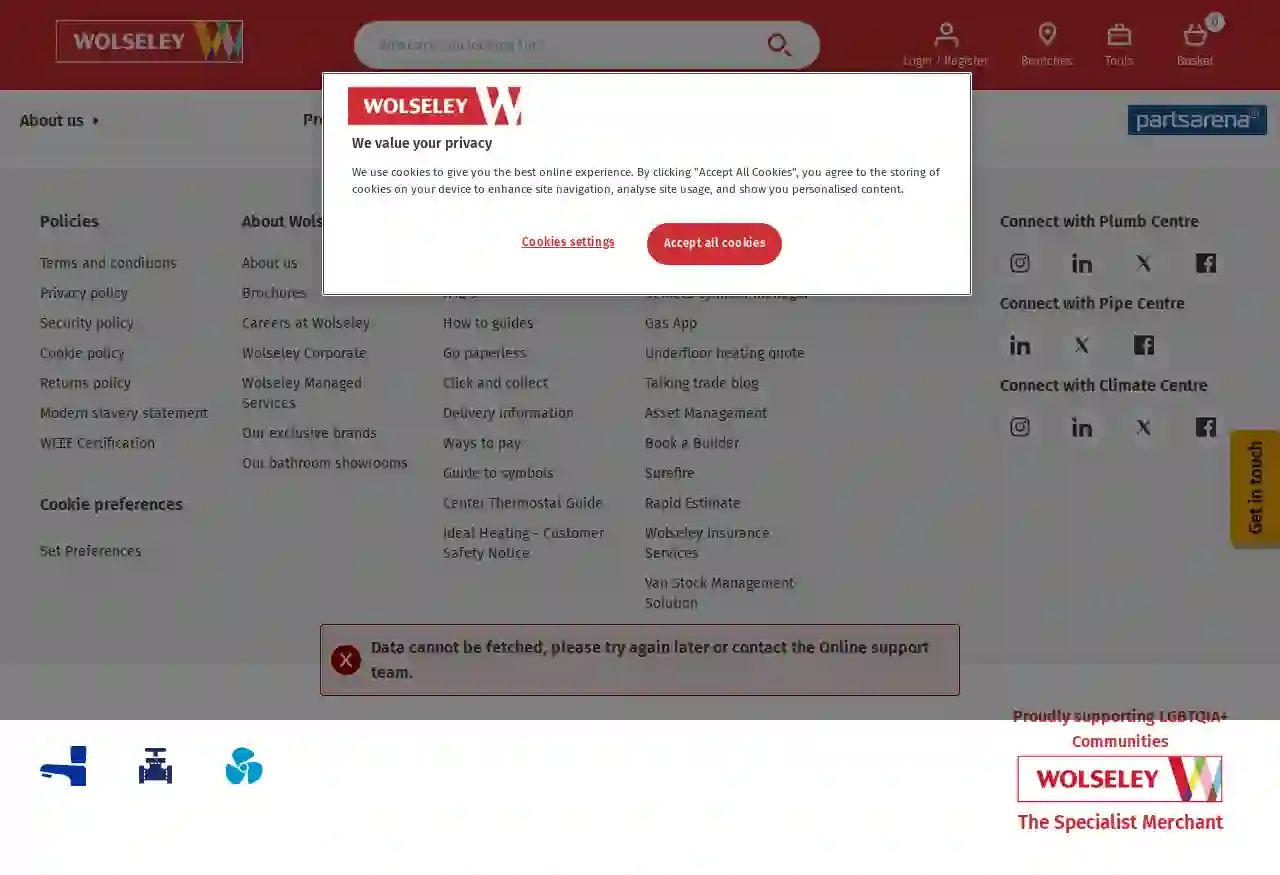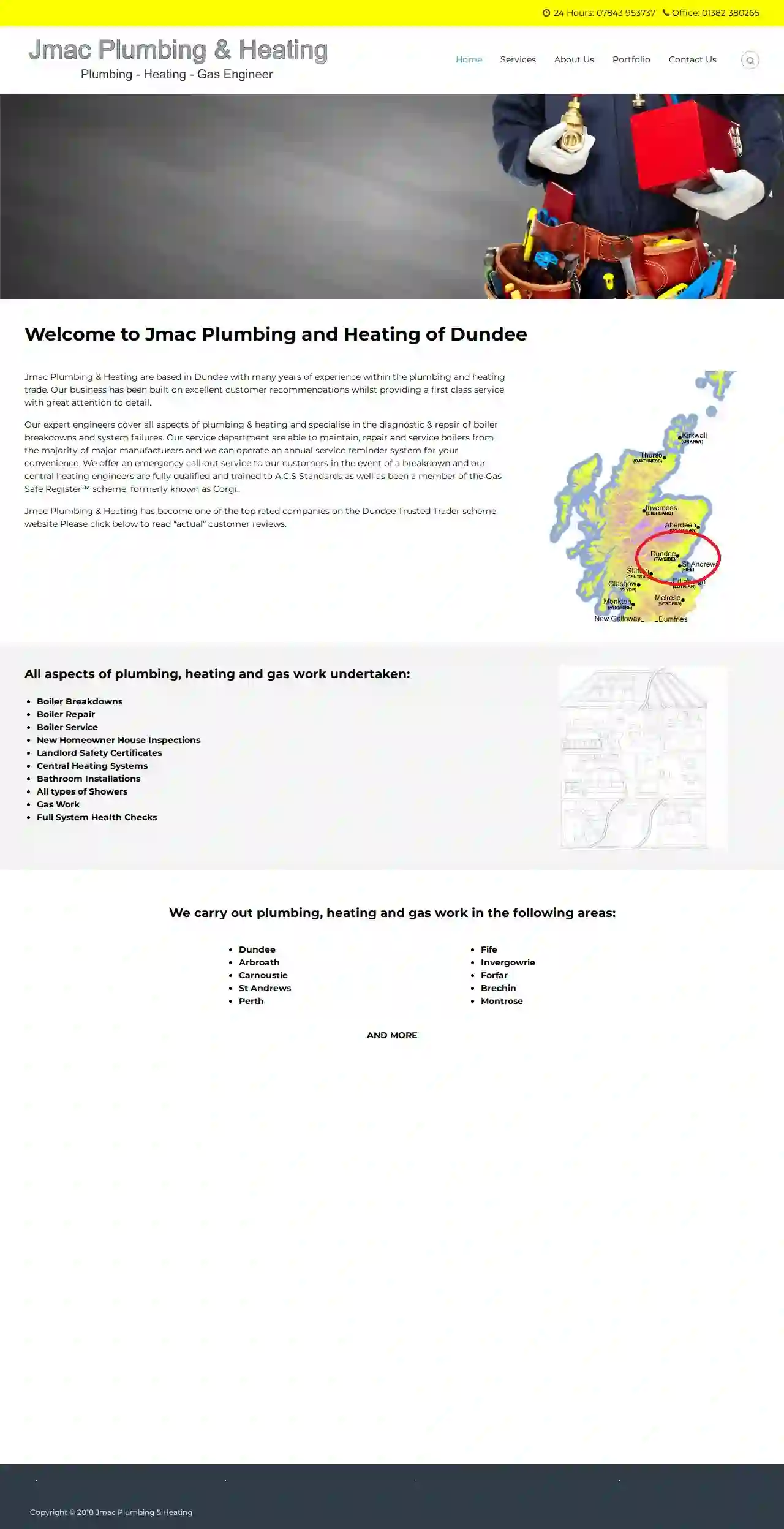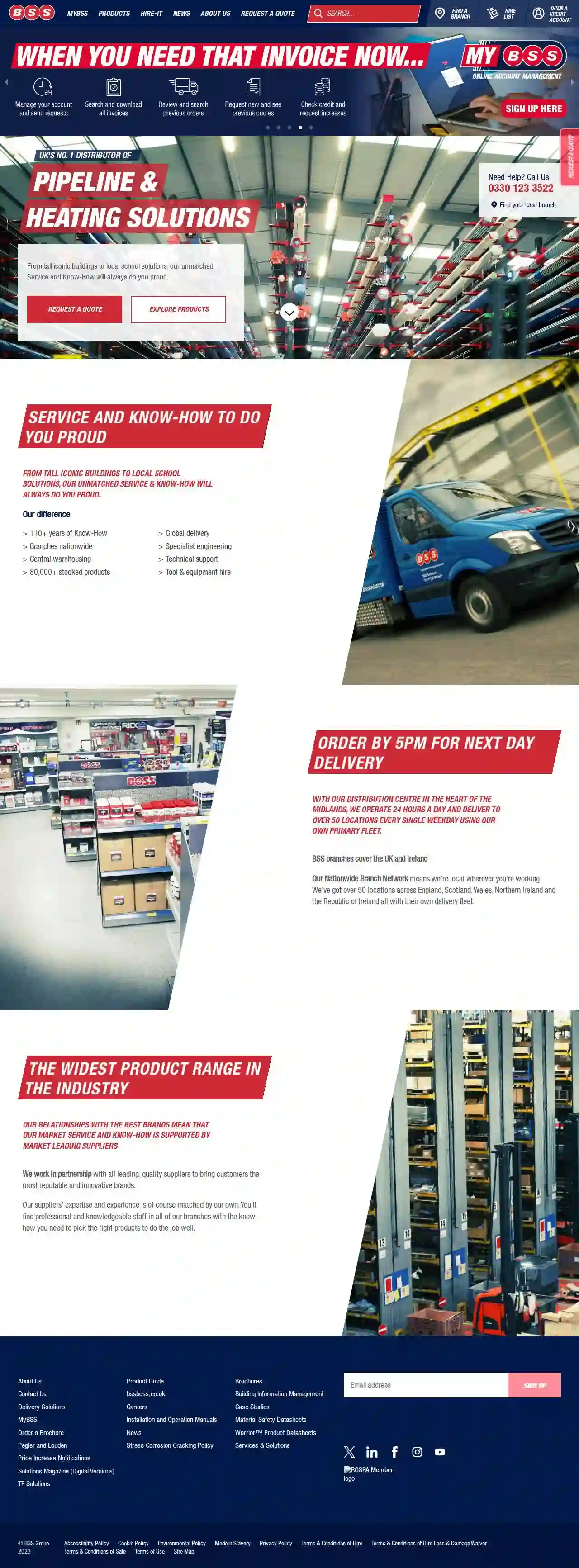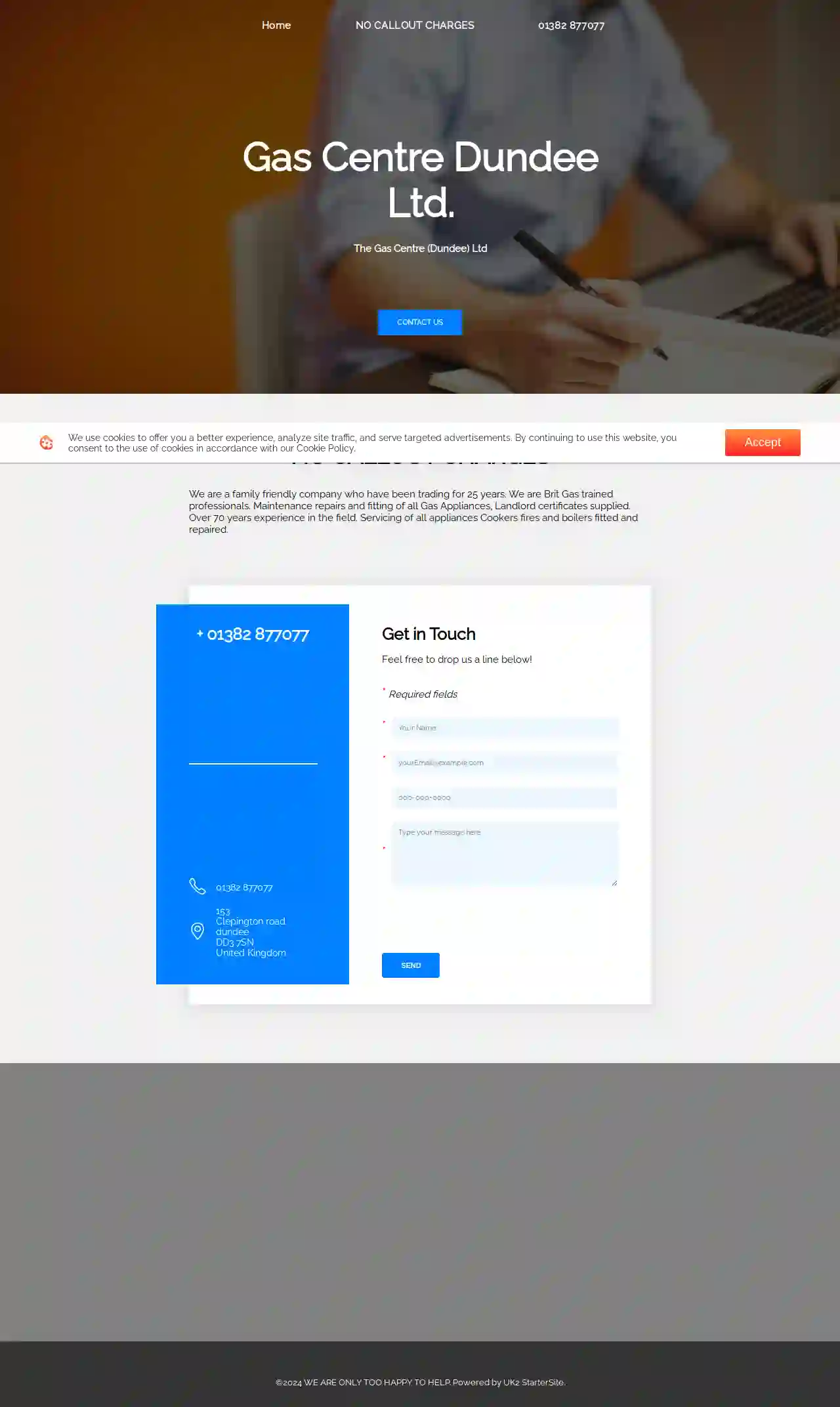Furnace Repair Dundee
Best Furnace Service in Dundee
Get multiple Furnace Service quotes for your project today! Compare profiles, reviews, accreditations, portfolio, etc... and choose the best offer.

Wolseley Pipe
4.713 reviews100-102 Commercial Road, Dundee, 100-102 Commercial Road, DD1 4TY, GBWelcome to Wolseley Pipe Centre, the UK's leading pipe specialist, offering an extensive range of commercial heating, plumbing, and drainage systems from industry-leading brands. Our experts provide expert advice and support to help you find the right solutions for your project, whether you're a seasoned professional or a DIY enthusiast. At Wolseley, we understand the importance of quality, reliability, and value. That's why we stock only the best products from trusted manufacturers, and we're committed to providing exceptional customer service every step of the way. With over 400 local branches nationwide, expert knowledge and stock is always close by. We're here to help you get the job done right, first time. Wolseley is a trusted supplier of plumbing and heating supplies. We have been working with them for many years and have always been impressed with their quality products and competitive prices.
- Services
- Why Us?
- Gallery
Get Quote
heat-it Dundee
10 Almond Crescent, Perth, PH1 3FB, GBKeeping you safe and warm, Fast, friendly and expert gas heating repairs, boiler installations, servicing and Landlord services from a local family business you can trust. Covering Perthshire and Dundee.
- Services
- Why Us?
- Accreditations
- Our Team
- Testimonials
- Gallery
Get Quote
Jmac Plumbing & Heating
510 reviewsDundee, GBWelcome to Jmac Plumbing and Heating of Dundee. Jmac Plumbing & Heating are based in Dundee with many years of experience within the plumbing and heating trade. Our business has been built on excellent customer recommendations whilst providing a first class service with great attention to detail. Our expert engineers cover all aspects of plumbing & heating and specialise in the diagnostic & repair of boiler breakdowns and system failures. Our service department are able to maintain, repair and service boilers from the majority of major manufacturers and we can operate an annual service reminder system for your convenience. We offer an emergency call-out service to our customers in the event of a breakdown and our central heating engineers are fully qualified and trained to A.C.S Standards as well as being a member of the Gas Safe Register™ scheme, formerly known as Corgi. Jmac Plumbing & Heating has become one of the top rated companies on the Dundee Trusted Trader scheme website. Please click below to read “actual” customer reviews.
- Services
- Why Us?
- Accreditations
- Gallery
Get Quote
Nucore Group Dundee Office
Berryhill Crescent, Unit 4C, The Core, Bridge of Don, AB23 8AN, GBNucore Group is a provider of safety critical integrated solutions. Our range of services including design, manufacture, installation, maintenance and commissioning makes us a unique turnkey provider of cost-effective HVAC & Refrigeration, fire safety and security solutions. Combining knowledge, expertise and best practice to deliver innovative engineering to protect people and assets, Nucore provides safety critical services and support for onshore and offshore oil and gas, marine, renewables energy and petrochemical industries, as well as public and private sector customers. Established in 2016 following the acquisition of legacy companies HVAC & Refrigeration Engineering and Oteac, Nucore Group merged these businesses in 2020 to further align our integrated offering. We recognise the importance of a strong and reliable supply chain and from our long-established strategic partnerships we ensure the highest standards of quality and services for our customers. Our innovative manufacturing hub enables us to develop and assemble bespoke, fit-for-purpose solutions from design to commissioning under one roof.
- Services
- Why Us?
- Accreditations
- Gallery
Get Quote
GS Plumbing & Heating dundee
55 reviews11 Molison Street, Dundee, DD4 6TH, GBAt GS Plumbing & Heating, we understand that finding a reliable plumber can be a challenge. That’s why we’re here to make it easy for you. As your go-to Dundee plumber, we offer a wide range of plumbing services to meet all your needs. We live (and work) in the local area too, so we are committed to providing the best service for our fellow residents, and understand the unique needs of our community. We’re here to help. We believe in being transparent and honest with our customers. That’s why we provide clear pricing and always put our customers first. You can trust us to provide excellent service with no hidden fees or surprises. Our goal is your satisfaction. We work hard to ensure that our customers are completely satisfied with our work. We don’t consider the job done until you’re 100% happy with the results.
- Services
- Why Us?
- Gallery
Get Quote
Dundee Plumbing & Heating
4.7141 reviewsDundee, GB- Services
- Why Us?
- Gallery
Get Quote
Pitalpin Heating and Gas Services
542 reviewsGreenlee Drive, Dundee, DD2 2RA, GBPitalpin Heating and Gas Services is a Dundee-based heating specialist, covering local areas including Dundee, Perth and Fife, and much more. Our experienced engineers have had 12 years in the heating industry and are fully Gas Safe registered to uphold high standards of safety throughout our work. Not only are our engineers experienced but we are qualified in every aspect holding Baxi accreditation. Giving you peace of mind that the service we provide is of the utmost quality. We offer a variety of general heating and gas services including: Boiler Repairs, Boiler Servicing, Boiler Installation, Radiator Installations, Central Heating Services, Gas Installations. All work is guaranteed and the most important thing of all is that we listen to our customers' needs to ensure they are happy with the work done. We're proud of our reputation and the feedback we get from our customers is amazing, take a look at our reviews.
- Services
- Why Us?
- Accreditations
- Our Team
- Testimonials
- Gallery
Get Quote
Pitkerro Plumbing & Heating Ltd
2.97 reviewsChristie House, 22 Mid Road, Dundee, DD3 7RP, GBWelcome to Pitkerro Plumbing & Heating Pitkerro are an established Plumbing and Heating company based in Dundee. We are specialists in contract work for new builds and refurbishment work and have extensive commercial experience. Featured Projects: Newcraighall, East Lothian As part of the 1500 new home development in Musselburgh, Persimmon Homes are building 473 properties, a mix of flats and houses. The first phase of development includes 118 affordable units. Pitkerro are undertaking the plumbing and heating installation work on the private housing site set to complete in early 2025. Former Craiginches Prison, Aberdeen Pitkerro are proud to have been a part of the £21 million project to convert the land formerly occupied by HMP Craiginches Prison into 124 Properties (108 houses and 106 flats). Robertson Construction handed properties over to Sanctuary Scotland Housing Association in 2018. Muirton Park Perth, final phase Caledonian Housing Association appointed Urban Union as developer for the final phase of the £52 million Muirton Park regeneration scheme. Main contractor, Robertson Partnership Homes, engaged Pitkerro to commence work in 2017. Completed in 2019, the 201 property site is a mix of social rented units, low cost units and privately owned units.
- Services
- Why Us?
- Gallery
Get Quote
BSS Dundee
4.34 reviewsThe Business Centre, Birmingham Road, Unit 10, Sutton Coldfield, B24 9RP, GBBSS Industrial is a leading supplier of industrial equipment and services, serving a wide range of sectors including manufacturing, construction, and engineering. With a comprehensive portfolio of products from renowned brands, we provide innovative solutions to meet the evolving needs of our clients. Our team of experienced professionals is dedicated to delivering exceptional customer service and technical expertise. We are committed to building long-term partnerships with our clients, providing them with the support and resources they need to succeed. At BSS Industrial, we understand the importance of quality, reliability, and efficiency. We source our products from trusted manufacturers and adhere to strict quality control standards. Our comprehensive range of services includes equipment installation, maintenance, repair, and training. We are dedicated to providing our clients with the highest level of service and support. Our mission is to be the preferred partner for industrial equipment and services, delivering value, innovation, and exceptional customer experiences.
- Services
- Why Us?
Get Quote
Gas Centre (Dundee) Ltd.
4.712 reviewsClepington road, 153, Dundee, DD3 7SN, GBWe are a family friendly company who have been trading for 25 years. We are Brit Gas trained professionals. Maintenance repairs and fitting of all Gas Appliances, Landlord certificates supplied. Over 70 years experience in the field.
- Services
- Why Us?
- Gallery
Get Quote
Over 12,692+ HVAC Contractors on our directory
Our HVAC contractors operate in Dundee & surrounding areas!
HVACCompaniesHub has curated and vetted the Best HVAC Contractors near Dundee. Find the most trustworthy pro today.
Frequently Asked Questions about Furnace Repair
- Change Air Filters Regularly: A clean air filter improves airflow, allowing your furnace to work more efficiently. How often you need to change your filters depends on factors like pets, smoking, and air quality.
- Schedule Annual Maintenance: An annual tune-up by an HVAC technician can optimize performance An annual checkup can extend the lifespan of your furnace.
- Seal Air Leaks: Prevent drafts from making your furnace work harder. Proper sealing increases energy efficiency and makes your home more comfortable overall.
- Upgrade Insulation: Make sure your home has adequate insulation in attics, walls, and floors to reduce heat loss.
- Use a Programmable Thermostat: Lower the thermostat setting at night or when you're away to save energy..
- Consider Zoning: If you have rooms that are rarely used or have inconsistent temperatures, consider installing a zoning system. divides your home into separate zones, each with individual temperature control, allowing you to heat or cool only the occupied areas, saving energy and improving comfort..
- Natural Gas Furnaces: fueled by natural gas Natural gas furnaces tend to be efficient and have lower operating costs compared to oil or propane furnaces.
- Propane Furnaces: Propane furnaces are similar to natural gas furnaces These are a good option in areas where natural gas isn't accessible.
- Oil Furnaces: Oil furnaces are less common than gas or propane furnaces but still used in certain regions. Oil units may require additional considerations for fuel storage and delivery.
- Electric Furnaces: Electric furnaces use electric resistance heating elements to generate heat.. Their installation cost is usually lower, but electricity prices can affect operating costs significantly.
How often should I get my furnace inspected?
How can I improve the efficiency of my furnace?
What is an AFUE rating?
What are the different types of furnaces?
How often should I get my furnace inspected?
How can I improve the efficiency of my furnace?
- Change Air Filters Regularly: A clean air filter improves airflow, allowing your furnace to work more efficiently. How often you need to change your filters depends on factors like pets, smoking, and air quality.
- Schedule Annual Maintenance: An annual tune-up by an HVAC technician includes inspection, cleaning, and adjustments to improve efficiency.
- Seal Air Leaks: Prevent drafts from making your furnace work harder. Proper sealing increases energy efficiency and makes your home more comfortable overall.
- Upgrade Insulation: Good insulation is essential for retaining heat and lowering energy bills. It's a good idea to check insulation levels periodically.
- Use a Programmable Thermostat: Lower the thermostat setting at night or when you're away to save energy..
- Consider Zoning: Zoning divides your home into separate zones, each with its own thermostat, allowing for custom climate regulation.
What is an AFUE rating?
What are the different types of furnaces?
- Natural Gas Furnaces: fueled by natural gas Natural gas furnaces offer cleaner energy, especially compared to oil.
- Propane Furnaces: Propane furnaces are similar to natural gas furnaces but run on propane, which is stored in a tank on your property..
- Oil Furnaces: Oil furnaces burn heating oil as fuel, which is stored in a tank. They require more maintenance and tend to be less efficient than gas furnaces.
- Electric Furnaces: Electric furnaces use electric resistance heating elements to generate heat.. Their installation cost is usually lower, but electricity prices can affect operating costs significantly.